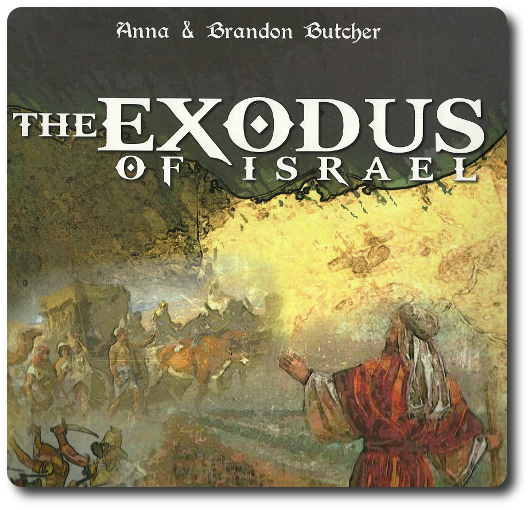
The Basics:
- For ages 5 and up
- For 2 to 4 players
- Approximately 20 minutes to complete
Geek Skills:
- Counting & Math
- Logical & Critical Decision Making
- Reading
- Pattern/Color Matching
Learning Curve:
- Child – Easy
- Adult – Easy
Theme & Narrative:
- Traverse the desert and find the promised land, one die roll at a time
Endorsements:
- Gamer Geek rejected!
- Parent Geek mixed!
- Child Geek mixed!
Overview
Disbelief, failure, and consequence. That is how one could sum up the reason for the 40 year curse of the Israelites who traversed the desert suffering hardship, famine, death, and despair. But it’s also a story of bravery, redemption, and of renewed and unquestionable faith. In this game, none of that happens, but your patience might be tested.
The Exodus of Israel, designed by Anna Butcher, Brandon Butcher, and self-published via the Game Crafter, is comprised of 4 Player pawns, 1 game board, 4 Scoring cubes, 8 Altar pieces, and 2 custom six-sided dice. The game board is made of thick cardboard and depicts different locations mentioned in the Bible. The cubes and markers are made of wood. The Player pawns are made of plastic. The custom six-sided dice will require stickers to be applied to them before the game can be played. Detailed instructions are provided to ensure this task is done once and correctly.
Prepare to Journey
To set up the game, first place the game board in the middle of the playing area.
Second, have each player select a Player pawn color and a matching Score cube. All players will place their Player pawn on the “Start” space (which is Egypt) and their Score cube on the “4” spot of the scoring track found on the game board. Place any unused Player pawns and Score cubes back in the game box.
Third, place the Altar pieces and dice to one side of the game board.
That’s it for game set up. Determine who will go first and begin.
And So Begins the Exodus
The Exodus of Israel is played in turns. A player’s turn is summarized here.
Step 1: Roll Dice
The player takes the dice and rolls them. The results of the role (represented by symbols) determines what action the player can take. If the rolled images do not match any given outcome indicated by the game rules, the player takes no further action this turn. Possible outcomes include the following.

- Move 1 space forward (Fire or Cloud and anything else, but another Fire or Cloud)
- Move 2 spaces forward (2 Clouds or 2 Fires)
- Move 4 spaces forward (1 Fire and 1 Cloud)
- Increase score by +1 (2 Shekels)
- Decrease score by -1 (2 Snakes)
- Receive 1 Altar piece (2 Altars)
Step 2: Movement and Space Resolution
Movement of the Player pawn must follow the designated path found on the game board. Arrows are provided to assist the player in knowing which space they must move to next.
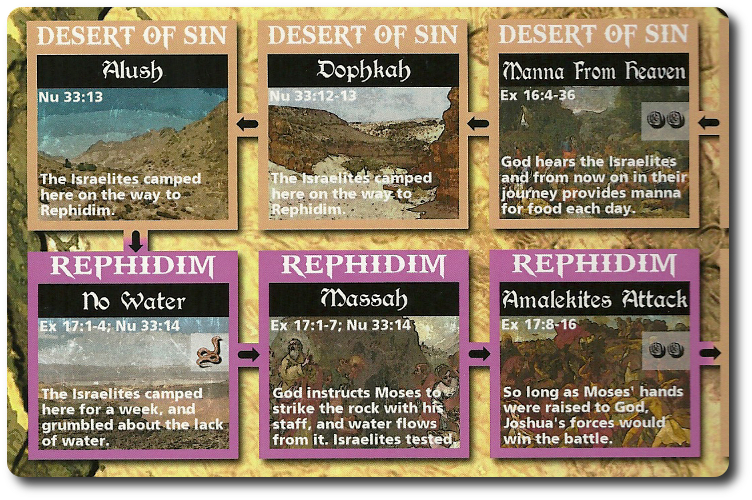
Each time the player moves their Player pawn to a new space, they must stop and resolve it. Possible actions include the following.
- Decrease score by -1
- Increase score by +1 for each “Shekel” icon
- Receive 1 Altar piece
In addition, some of the spaces have more than one icon on them. In all case, each icon is resolved individually. For example, landing on a space with 1 Altar and 3 Shekels would give the player 1 Altar piece and 3 points to score.
If a player runs into an opponent, the player must decide if they “bump” the opponent to the next space, forcing the opponent to then resolve the new space they move into, or they can leapfrog the opponent, jumping forward and over. In either case, new spaces moved into must ALWAYS be resolved, even if it means resolving a space out of turn. It’s also possible that such a move will cause a ripple effect that will impact 2 or more players at the same time. I suggest you tip a Player pawn over on its side to indicate that it has been moved and needs to be resolved, as it can be a bit confusing at times if everyone is bumping into each other.
Each space also includes a verse from the Bible and where a more detailed description of the Exodus at that moment can be found. Players are encouraged by the game designers to read them, but not doing so has zero impact on the game play.
The player’s turn is now over and the next player in turn order sequence now goes.
Altars and Shekels
Shekels count as points in the game. Players are never actually given any Shekels. Instead, the number of Shekels they have earned is scored as points. Since each player has 4 points at the start of the game, it’s reasonable to believe that each player left Egypt with a few Shekels to their name.
Altars are kept by the player and can be used to double the bonus of a space by returning the Altar to the side of the game board. For example, if the space has 2 Shekels, the player can turn in 1 Altar piece to receive 4 Shekels instead. Using the Altar only increases the number of Shekels earned, not the number of Altars collected.
Out of the Desert
The first player to reach the “Finish” space is awarded +4 points. The game then temporarily pauses as each player determines how far away their Player pawn is from the “Finish”space. For each new colored set of spaces away from the “Finish” space, a player is penalized -2 points.
Then the game resumes and continues until each player has moved their Player pawn to the “Finish” Space. The winner of the game is the player with the most points. Ties are broken by counting the number of unspent Altar pieces.
Game Variant
The game comes with extra stickers that will not fit on the custom six-sided dice. If the owner of the game likes, they can apply these stickers to different spaces on the game board, changing what is normally encountered at that space.
To learn more about The Exodus of Israel, visit the game’s web page on the Game Crafter.
Final Word
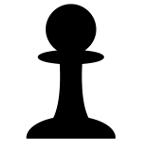 The Child Geeks quickly learned the game and then just as quickly became bored. The more advanced and skilled Child Geeks found The Exodus of Israel to be a monotonous roll-and-move affair with little to no real decision making. According to one such Child Geek, “All I do is move and do what it says on the space I land on. The only real decisions I make is decided how to spend the Altars, which you always should. The game is boring.” A younger Child Geek who was having a good time said, “I leaned about this in Sunday School. It’s fun to play it out as a game.” When the games were over, the Child Geeks were mixed. One half wanted to see the game lost in the desert forever, while the other was happy to take the journey.
The Child Geeks quickly learned the game and then just as quickly became bored. The more advanced and skilled Child Geeks found The Exodus of Israel to be a monotonous roll-and-move affair with little to no real decision making. According to one such Child Geek, “All I do is move and do what it says on the space I land on. The only real decisions I make is decided how to spend the Altars, which you always should. The game is boring.” A younger Child Geek who was having a good time said, “I leaned about this in Sunday School. It’s fun to play it out as a game.” When the games were over, the Child Geeks were mixed. One half wanted to see the game lost in the desert forever, while the other was happy to take the journey.
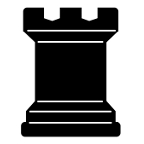 The Parent Geeks mostly appreciated the game for its education value, but found little in the way of entertainment value. According to one Parent Geek, “The game is very simple, and that’s a good thing when you want to focus in on the lesson, but I think it’s a shame the game couldn’t be more engaging.” Another Parent Geek said, “As far as games go, this is one of the simpler I have ever played. Reminds me of Candy Land, except for the Bible. I don’t think I’d ever play this for fun with the family, but I think it would make for a great tool for religious educators of young children.” Again and again, the comments highly praised The Exodus of Israel as an education tool, but not as a game in and of itself. When the votes were in, the Parent Geeks gave the game a mixed vote. Much like the Child Geeks, roughly half of the group found a good deal of merit with the game, while the other half found it to be forgettable.
The Parent Geeks mostly appreciated the game for its education value, but found little in the way of entertainment value. According to one Parent Geek, “The game is very simple, and that’s a good thing when you want to focus in on the lesson, but I think it’s a shame the game couldn’t be more engaging.” Another Parent Geek said, “As far as games go, this is one of the simpler I have ever played. Reminds me of Candy Land, except for the Bible. I don’t think I’d ever play this for fun with the family, but I think it would make for a great tool for religious educators of young children.” Again and again, the comments highly praised The Exodus of Israel as an education tool, but not as a game in and of itself. When the votes were in, the Parent Geeks gave the game a mixed vote. Much like the Child Geeks, roughly half of the group found a good deal of merit with the game, while the other half found it to be forgettable.
 The Gamer Geeks tore this game apart. According to one Gamer Geek, “This is a worthless game. Total trash. There is no game here. You roll. You move. You do something. Turns over. How is that a game? I put more thought into picking my nose.” Another Gamer Geek said, “I can see this being a good tool for educators, but zero fun for their students.” What the Gamer Geeks liked the least was the total lack of real choice and value in playing the game. The path was set, the decisions regarding the Altars were seen as a no brainer (always spend those Altars, kids), and the game itself barely scratched the surface of the theme and narrative it was attempting to portray. As one Gamer Geek put it, “Not being a terribly complicated game is OK, but not being terribly complicated or exploring the very theme you are supporting the game on is the ultimate sin. And, yes, I know I’m being ironic.” When the votes were in, the Gamer Geeks all kicked The Exodus of Israel to the curb, banishing it back into the desert from which it came.
The Gamer Geeks tore this game apart. According to one Gamer Geek, “This is a worthless game. Total trash. There is no game here. You roll. You move. You do something. Turns over. How is that a game? I put more thought into picking my nose.” Another Gamer Geek said, “I can see this being a good tool for educators, but zero fun for their students.” What the Gamer Geeks liked the least was the total lack of real choice and value in playing the game. The path was set, the decisions regarding the Altars were seen as a no brainer (always spend those Altars, kids), and the game itself barely scratched the surface of the theme and narrative it was attempting to portray. As one Gamer Geek put it, “Not being a terribly complicated game is OK, but not being terribly complicated or exploring the very theme you are supporting the game on is the ultimate sin. And, yes, I know I’m being ironic.” When the votes were in, the Gamer Geeks all kicked The Exodus of Israel to the curb, banishing it back into the desert from which it came.
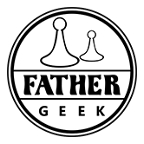 After years of playing games and reviewing them, I have come to the conclusion that game designers always have an agenda when it comes to what they want their players to get out of the game. I don’t mean to suggest a nefarious plot to undermine humanity or subconsciously alter ideals (although there are some games where I think that is exactly the reason they exist). Rather, I mean the game designer has a very clear mission and message they are attempting to pass on to the player. In this game’s case, I believe that mission is education and the message is one of excitement to learn more about an epic journey. Or, better put, a means to education.
After years of playing games and reviewing them, I have come to the conclusion that game designers always have an agenda when it comes to what they want their players to get out of the game. I don’t mean to suggest a nefarious plot to undermine humanity or subconsciously alter ideals (although there are some games where I think that is exactly the reason they exist). Rather, I mean the game designer has a very clear mission and message they are attempting to pass on to the player. In this game’s case, I believe that mission is education and the message is one of excitement to learn more about an epic journey. Or, better put, a means to education.
That game itself is very straight forward and is by many standards exceedingly simple. Roll-and-move games are one of the most easy games to design because they don’t put any decision making into the player’s hand or challenge their mind. Candy Land is a great example of such a game. Dice or cards are used to tell the player what to do, the player does it, and that’s it. The only decisions in this game to make are whether to use Altars or how to adjust groups of players when movement causes an Exodus traffic jam in the desert.
One thing is for certain, and all our players caught this in the first 5 minutes of game play, earning points is the most important aspect of the game. Finishing first does nothing but earn you points, but since movement is random, there is no telling how many or how few points you’ll have when you cross the finish line. Worse yet, players are always pushed to the finish line, forcing them to end their game playing experience when they might not want to. Again, we see the lack of choice and the game’s emphasis on education rather than the game play itself.
Which is not a bad thing, but it’s not a fun thing either. Game play is meaningless unless you plan on using the game as a jumping point into a Biblical lesson with kids or adults. If you aren’t Christian, the game holds even less values unless you are interested in learning about other religions. In all cases, the game fails to entertain and encourage further reading, but does suggest – strongly – that it wants to. This means that the individual running the game has a weighty responsibility. They will have to connect the game to meaningful activities that are not part of the game. Then and only then, in my opinion, will The Exodus of Israel shine.
The story of the Israelites traversing the desert for 40 years is an incredible tale, be you Christian or not. That would make a great board game as there are so many different ways to explore the decisions being made, survival in a harsh landscape, and the unquestionable resolve of the people who wandered with hope and faith as their guide. This game captures none of that and waters down the epicness to nothing more than rolling dice and waiting for turns. A missed opportunity for both the game player and the individual who wants to learn more about the 40 year march through the wilderness. I didn’t care for the game and nor did many of our players, but the game might be well received with very young players in Sunday School or at home schools. Give it a try and learn for yourselves.
This game was given to Father Geek as a review copy. Father Geek was not paid, bribed, wined, dined, or threatened in vain hopes of influencing this review. Such is the statuesque and legendary integrity of Father Geek.




It’s my first time to come across your website, Father Geek! I must say the reviews are quite comprehensive. It’s cool how you categorized comments from children, parents and gamer geeks. Agree that Exodus is probably good for the educational value, but yeah, maybe there could be a more engaging way to talk about the story of Israel.
Thanks for taking the time to read the review and leave a comment, Pat.
It’s a tricky balancing act. While the game might be intended to introduce a topic of discussion outside of the game, where is the line drawn that separates the game play from distractions that take away from the game? If the players were to pause each time they moved to a new space to read a Bible verse, the game would take much longer than designed. However, if players don’t take the time at all, what use is the game?